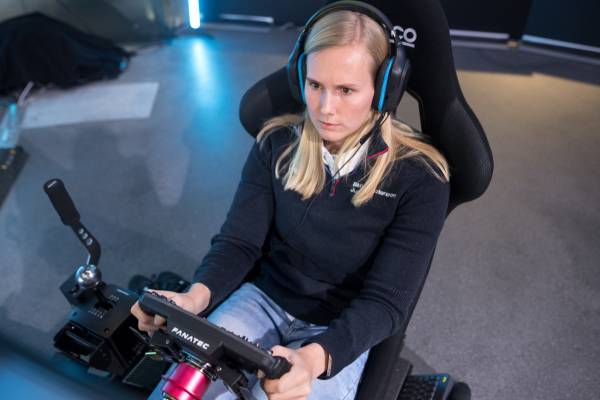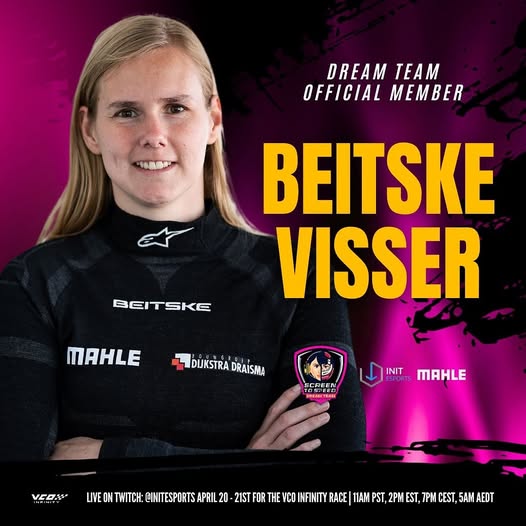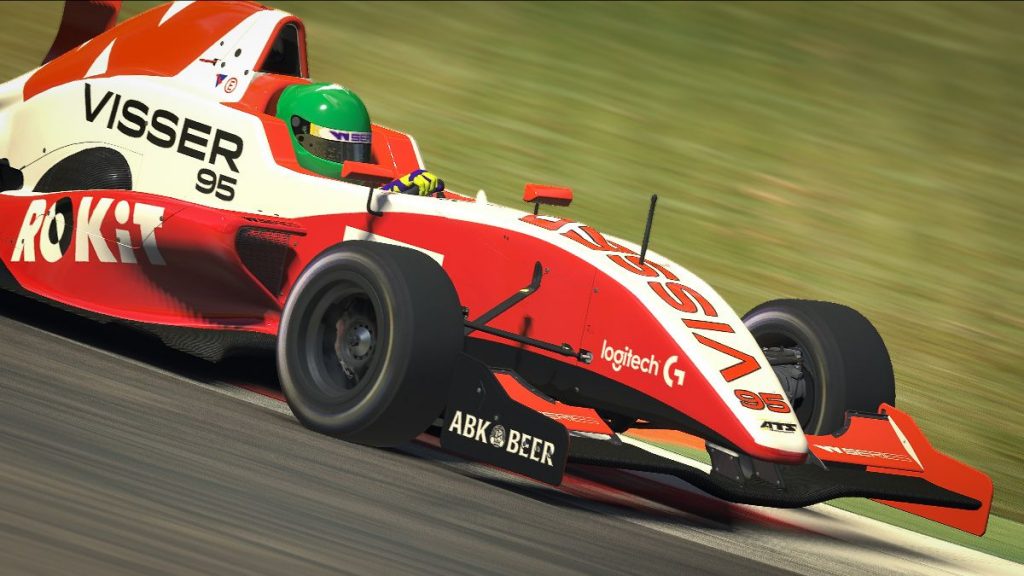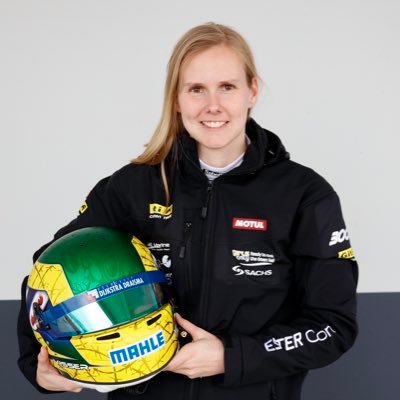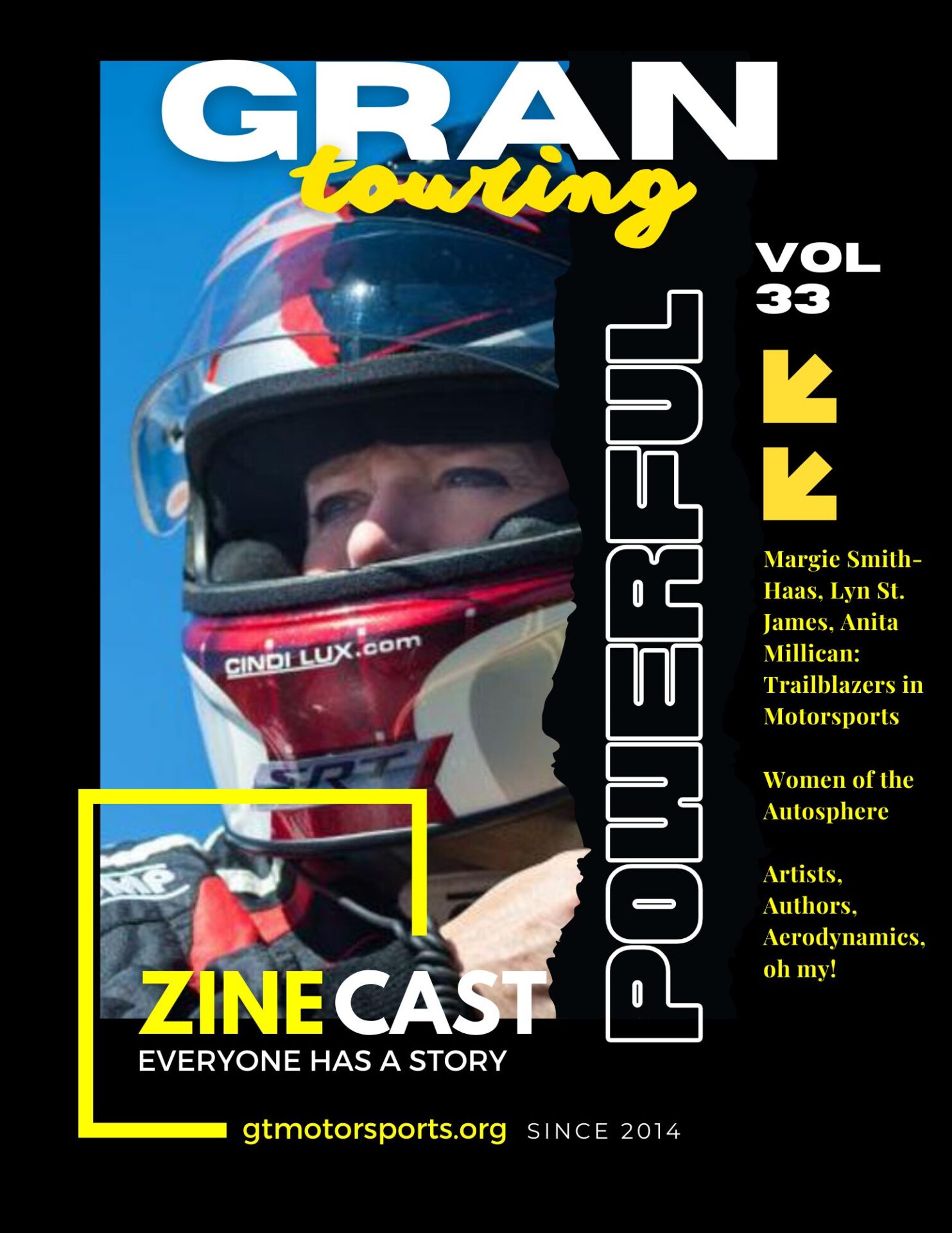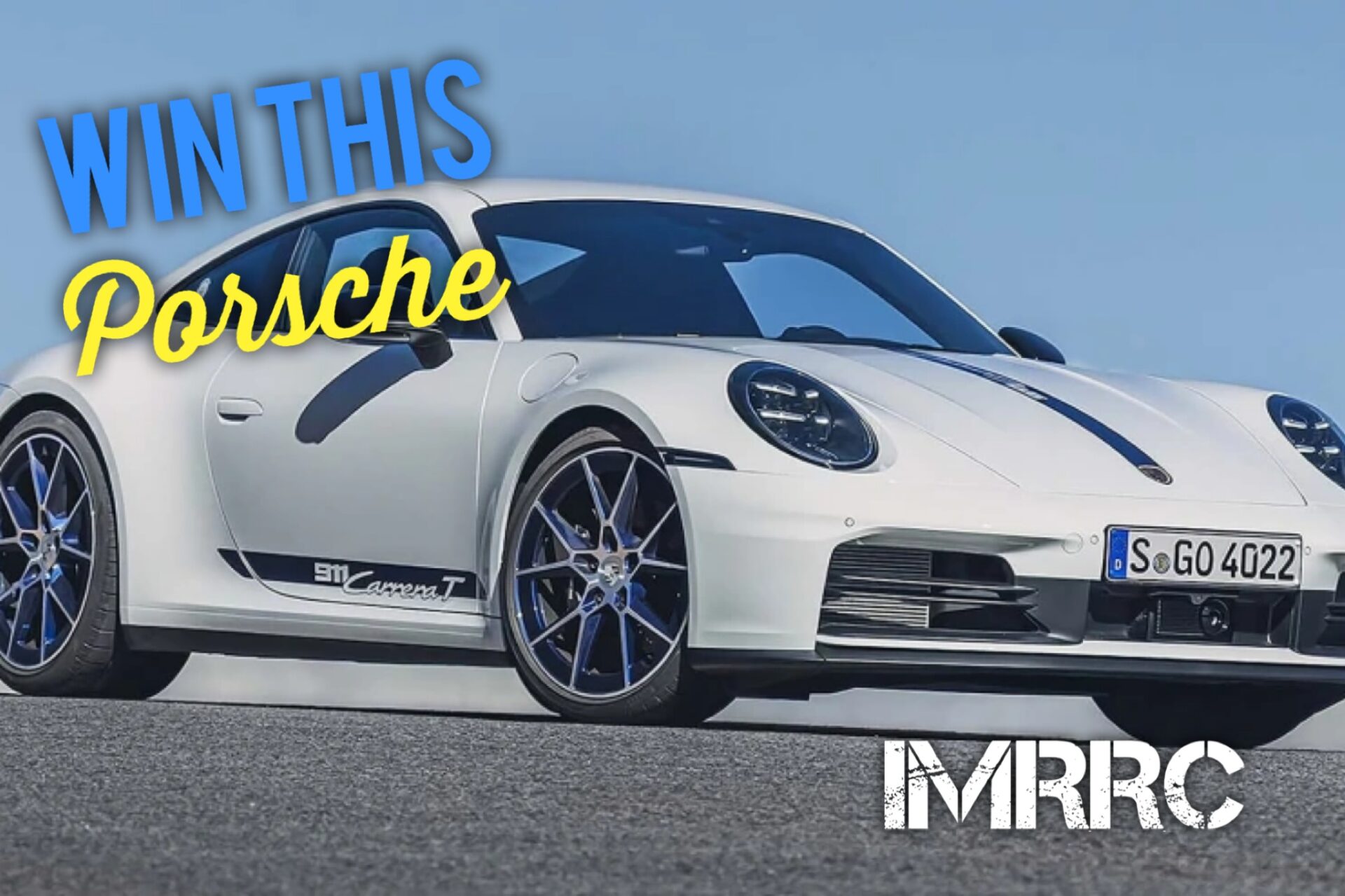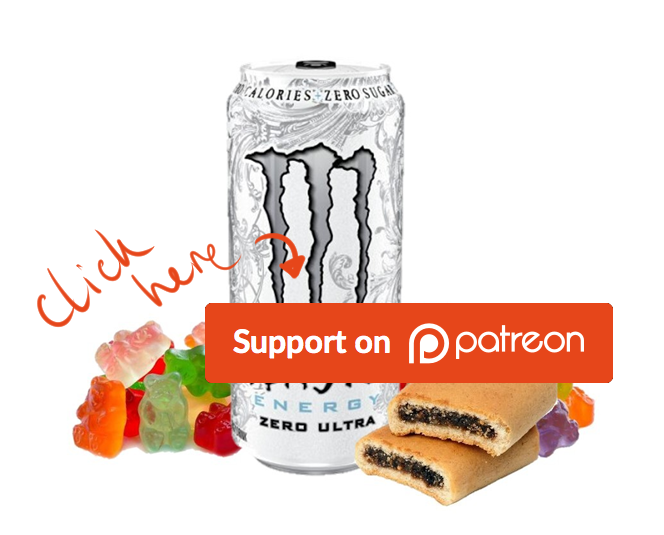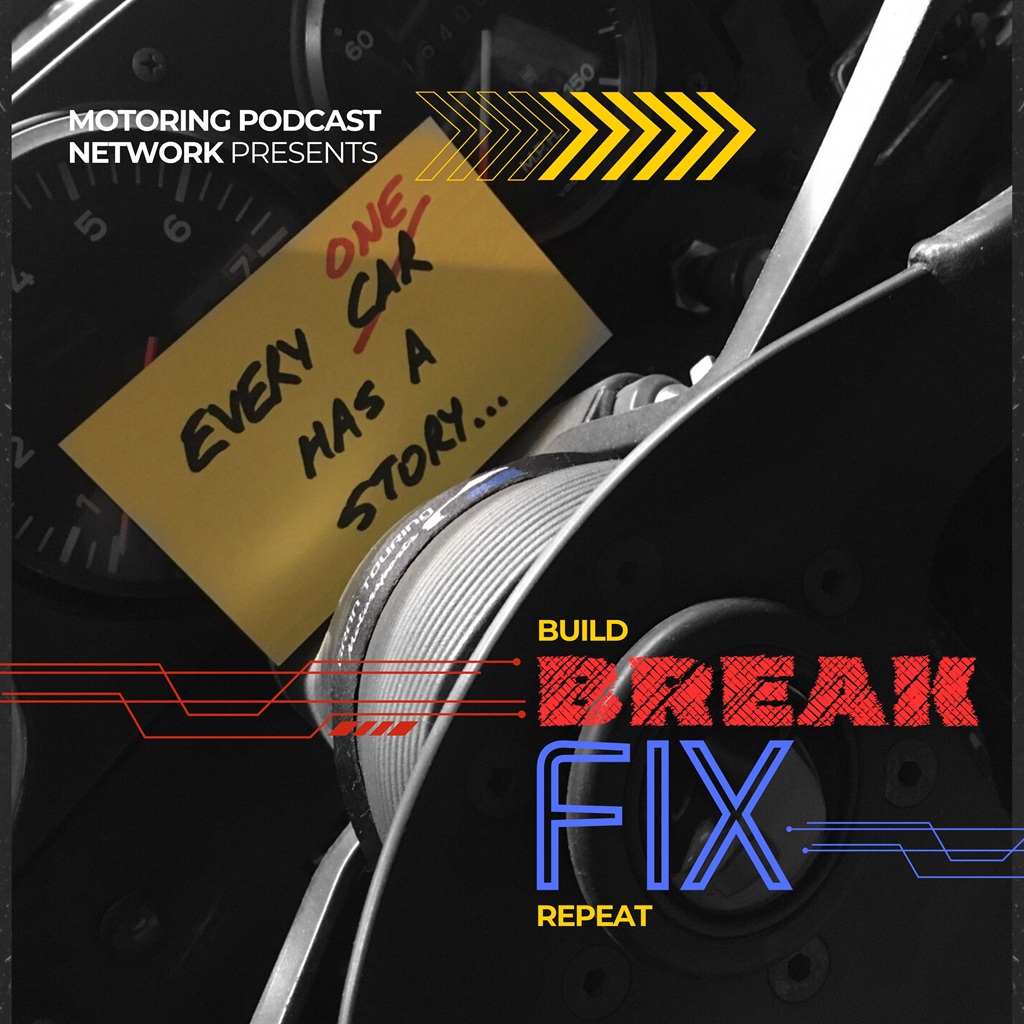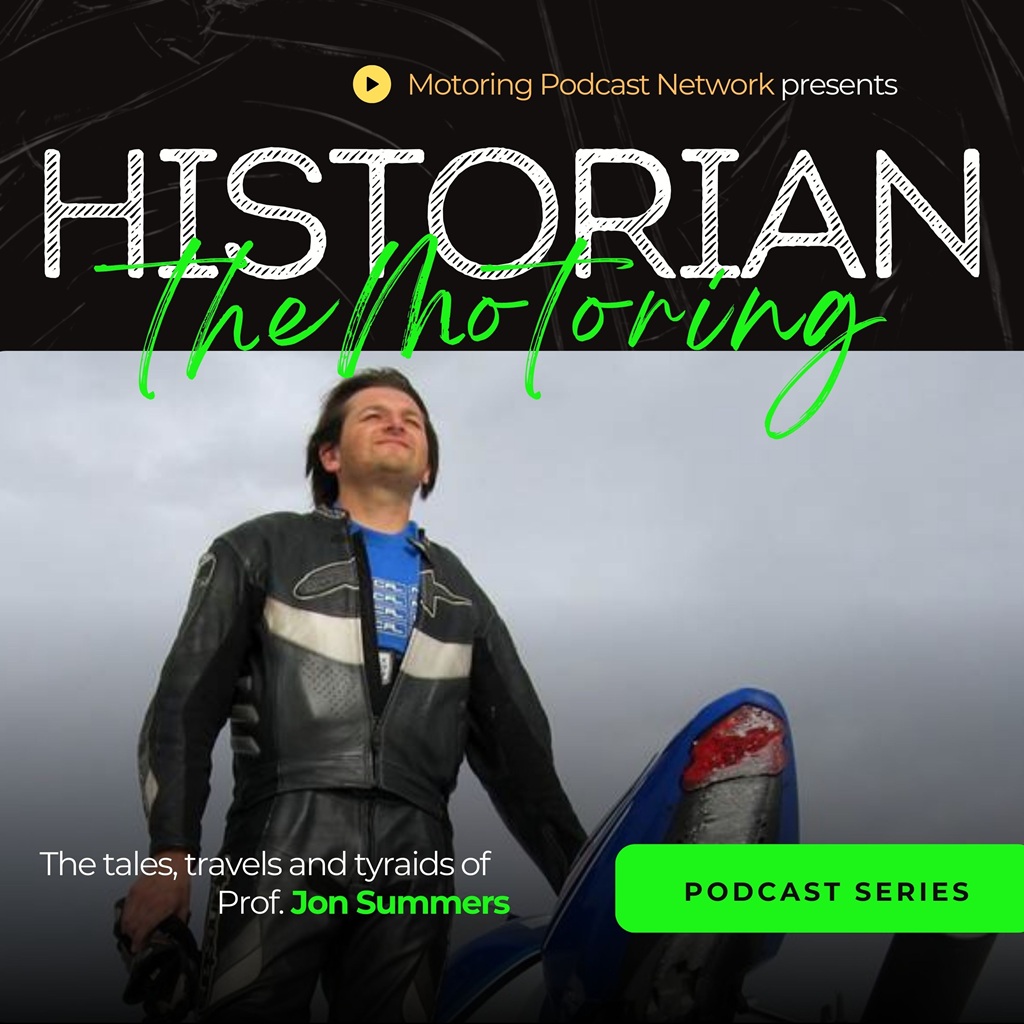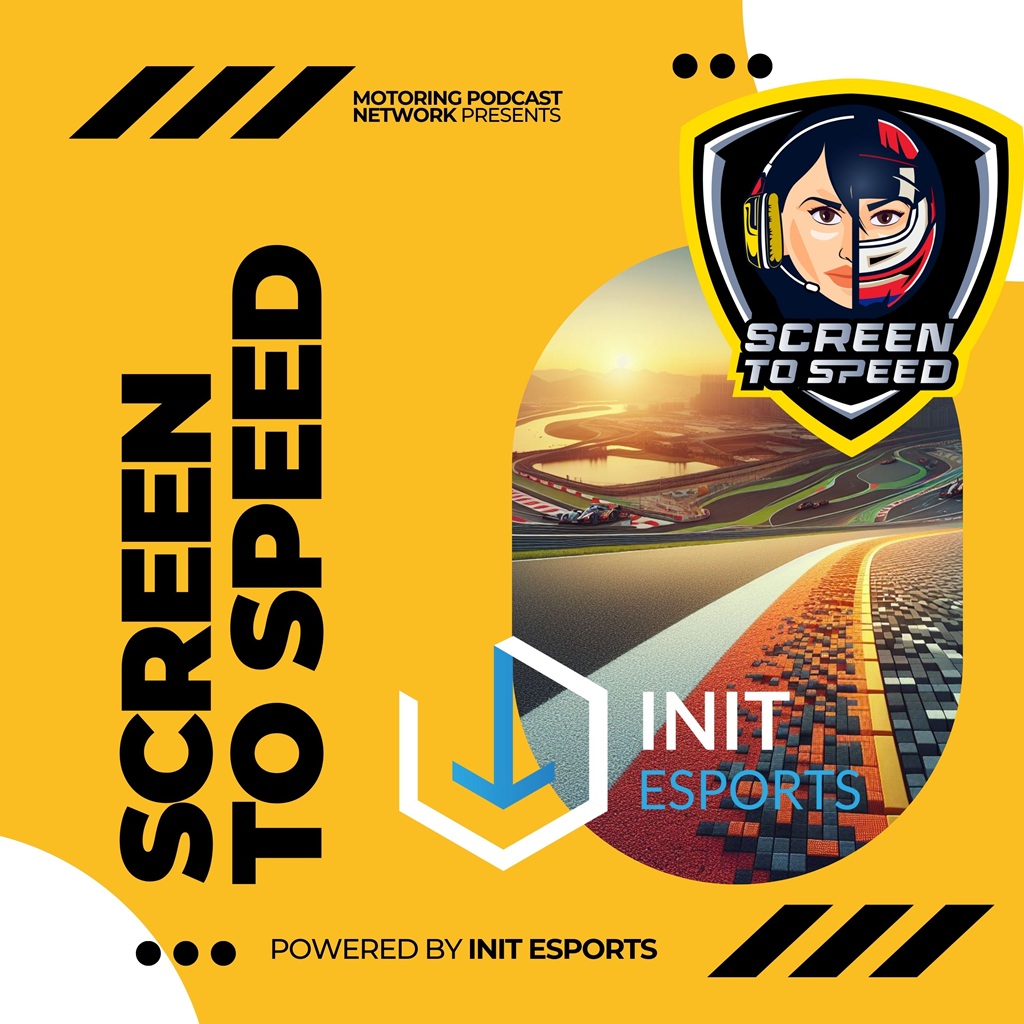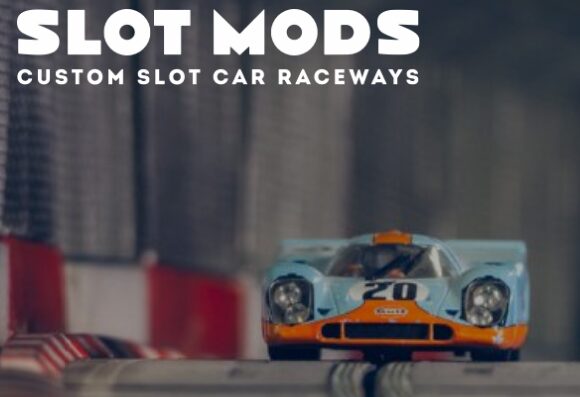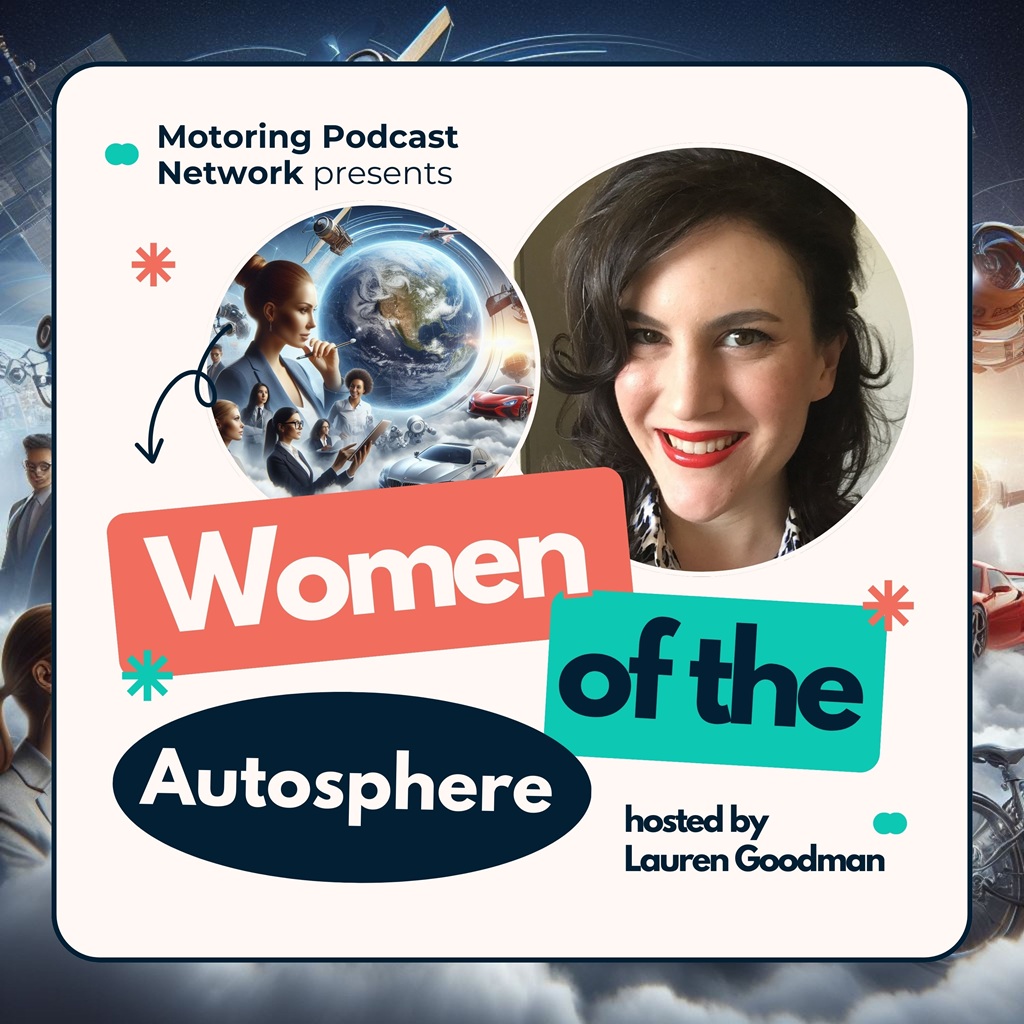Beitske Visser is a professional racing driver from the Netherlands. She is best known for her versatility across multiple racing disciplines, including single-seaters, touring cars, and endurance racing. Visser began her motorsport career in karting before transitioning to open-wheel racing, where she competed in the Formula BMW Talent Cup and ADAC Formel Masters, achieving multiple race wins and podiums.
In 2019, Visser gained international recognition as a front-runner in the W Series, a single-seater championship exclusively for women. She finished as the championship runner-up in its inaugural season, solidifying her status as one of the top female racers in the world. Her consistency and speed in the series earned her a reputation for being a tough competitor.
Beyond the W Series, Visser has also competed in endurance racing, including the European Le Mans Series (ELMS) and the prestigious 24 Hours of Le Mans. She has driven for renowned teams such as BMW Motorsport, competing in GT and endurance categories.
Visser is highly regarded for her technical understanding of racing and her ability to adapt to different car types, from single-seaters to GT and endurance machinery. She continues to build on her successful racing career, competing at a high level in multiple international championships.
Watch the livestream
Tune in everywhere you stream, download or listen!
 |  |  |
- Highlights
- Transcript
Highlights
Skip ahead if you must… Here’s the highlights from this episode you might be most interested in and their corresponding time stamps.
- 00:00 Introduction to Screen to Speed
- 00:49 Meet Beitske Visser: A Racing Prodigy
- 01:19 Karting Beginnings and Early Success
- 02:46 Transition to Formula Racing
- 04:34 Challenges and Triumphs with Red Bull
- 06:35 From Formula Renault to GT Racing
- 09:38 Endurance Racing and the W Series
- 15:45 Sim Racing and the Impact of COVID-19
- 27:40 Future Aspirations and Advice for Aspiring Racers
- 36:38 Conclusion and Acknowledgements
Transcript
Crew Chief Brad: [00:00:00] Welcome to Screen to Speed powered by INIT Esports. In this podcast, we dive into the journeys of remarkable individuals making waves in sim racing and bridging the virtual with the real. From the thrill of digital circuits, to the roar of real life racetracks, we explore the passion, Dedication and innovation that drives the world of motor sports.
We’ll hear from athletes, creators, and pioneers sharing their stories, insights, and the powerful ways sim racing is connecting communities and creating pathways into motor sports. So buckle up screen. The speed starts now.
Lyubov Ozeretskovskaya: Hi everyone. Welcome to unique talks. Happy to see here. Um, today we got, uh, absolutely amazing racing driver was brilliant career, uh, in motorsport. Betsky Wieser. [00:01:00] Betsky, welcome to any talks.
Beitske Visser: Yeah, thank you.
Lyubov Ozeretskovskaya: Yeah. Thank you so much for joining us today. Um, let’s start with, uh, how you started your racing career.
Um, I know that that’s been in karting for us, for many racing drivers. Uh, so yeah, let’s start with this.
Beitske Visser: Uh, yeah, like many racing drivers, I started very young in, in karting. I started when I was five years old. Uh, I, I basically grew up around cars cause my parents, they used to have a car dealership. Um, so basically since I was a couple of days old, my mom took me back to work again with her.
So I was always around there. Maybe from when I was around two, I was riding around the showroom on like, uh, how do you call them? That like those little cars where you have to use your feet to move forward. Um, and, and since I was three years old, I was starting to ask, um, to [00:02:00] start with go karting. So yeah, then on my fifth birthday, I got a go kart and, uh, I was straight away addicted.
Lyubov Ozeretskovskaya: What do you remember most about those days when you started karting? Like your first emotions when you get in, uh, being five years old?
Beitske Visser: Um, well, it’s difficult to, to remember exactly the emotions cause it’s very long time ago, but, um, Yeah, I mean, if I look back at the pictures from then, I had a smile from ear to ear and, uh, I was always, uh, asking my parents that I wanted to go to the go kart track, um, every Wednesday afternoon out of school, I went to the track every weekend.
Um, so yeah, I, I just loved being there.
Lyubov Ozeretskovskaya: That’s awesome. Uh, and I know that you had a really good, uh, racing career in karting, so you’ve been into Kiza 2 class, uh, so tell us more about, uh, this and then how you moved to the Formula S, uh, and like, uh, started your, [00:03:00] um, big racing career after karting.
Beitske Visser: Uh, yes.
So when I was 14, I was, I was racing in junior still, um, but I was very tall, uh, for my age. Uh, so we were looking at what to do the next year and we thought about going to shifters. Um, everybody said that, uh, we were stupid because I was a young 14 year old girl. Uh, no way we could be strong enough. Uh, nobody would make that move, but.
We did it anyway, and, uh, we got the chance to do it with Intrepid. Um, and it turned out to be one of the best decisions in my career because, uh, against anyone’s expectations, uh, I managed to win the WSK championship, uh, on my first year. Um, and also the European championships, uh, I was, uh, leading until the, the last race.
Um, So yeah, that, that was a very good move and, uh, very [00:04:00] cool also to, to race in KZ, uh, like all over the world.
Lyubov Ozeretskovskaya: Yeah, KZ2, uh, absolutely incredible, uh, class and karting, I think it’s one of the best. It’s really, uh, fast cars and, uh, karts, um, and also, you know, competitive, uh, uh, Class as well. Uh, so I know that he moved to DAC formal masters after this.
And, um, I guess that you get into Red Bull during your program or that happened after a DAC formal masters?
Beitske Visser: Uh, well, the, the first year I, I raced in ADAC formal masters, uh, I was with And I had a pretty good season, even though I also had two very big crashes, so I didn’t do the whole championship. Um, and then after that, uh, I signed with Red Bull and did another year in, uh, ADAC formal masters.
But, uh, unfortunately the second year didn’t, we didn’t [00:05:00] get the results, uh, which we were hoping for. Uh, But yeah, we still got, uh, some podiums and some wins. So still not terrible season, but not, uh, not what we expected.
Lyubov Ozeretskovskaya: Mm hmm. Uh, how was it to you to be a Red Bull, uh, in Red Bull program? How was it for you?
I know that you, uh, left the program, um, and, uh, you, you wasn’t really satisfied with this. Uh, so. Tell me more about this.
Beitske Visser: Well, with the program itself, I was, I was very happy. Um, they, they helped a lot with preparing for the, for the races. Um, I went to the, the simulator in Milton Keynes, um, yeah, to do simulator work there.
And, uh, also they gave me a trainer. Um, so he would write me training programs. I would go on training camps. Um, To, to make sure I’m fit and, uh, fun fact, this trainer is still my trainer today. Um, so yeah, he’s definitely been, uh, been a [00:06:00] good trainer and, uh, yeah, I mean, they, they just give you a lot of support and, uh, for the races.
So the program itself has definitely been good. I was just disappointed with the results that year.
Lyubov Ozeretskovskaya: Uh, what kind of results do you have, uh, with Red Bull?
Beitske Visser: Uh, I think I finished B8 in a championship, uh, but we were hoping for a top three in a championship. All
Lyubov Ozeretskovskaya: right. So you just, uh, didn’t meet your expectations for the championship.
That’s understandable. Definitely. Uh, so then, uh, you moved to Formula Renault 3. 5. I remember I watched a few of your races when you raced there and, uh, you know, that’s a big car, uh, almost like a F2. Uh, and, uh, how was it for you to move from like a junior Formula to higher level Formulas?
Beitske Visser: This was again, a very massive step, like I did in karting.
Um, but like, [00:07:00] uh, ADHC Formula Masters is basically like Formula 4. Even a little bit slower. And then Formula Renault 3. 5 is like Formula 2. So I skipped all the steps in between and went straight, straight up there. So we knew the first year was going to be a learning year. Also physically, we knew that I would have to work very hard because, you know, there’s no force, um, power steering and, uh, Yeah, there’s a lot of G forces in the corner, so I would have to train very hard.
Um, so I moved to Spain to be with the, with the team. And, uh, basically every day I was there, I woke up, I went to the gym, then I went to the team, I drove on the simulator, I went back to the team. Gym to train again. And, and that was, that was my day. But, uh, yeah, I got, I got strong enough, which was good.
And, uh, yeah, for sure it was a, a very difficult championship. ’cause you, you had, uh, [00:08:00] basically it was the, the stepping stone for, uh, formula One. Mm-hmm . So, yeah, it was, was very cool to, to register.
Lyubov Ozeretskovskaya: Yeah, definitely. That’s a completely different series compared to what you raised before. Uh, you mentioned that you had, like, really hard training.
Uh, did you do this, uh, every day or you had, like, a few days in a week when you did this?
Beitske Visser: Uh, so Monday to Fri to Friday was like that. Uh, so two times gym. Uh, through the, throughout the day and then like in between, I was on the simulator at the team and then I was living in Barcelona and, uh, on, on, I remember on Tuesday and Thursdays in the evening, the, the track, the racetrack would open for bicycles.
So I would go cycling there and, uh, in the weekends I would have usually one day off and the other day some easy cardio, but yeah, it, it was, it was hard work. Yeah.
Lyubov Ozeretskovskaya: Yeah. Uh, did this, uh, hard work [00:09:00] help you, uh, to feel better in the formal Renault 3. 5? Like, uh, physically, did you manage to, like, maybe feel more relaxed in the, uh, in the race, uh, with all this, uh, training, which you did?
Beitske Visser: Yeah, definitely. I mean, it’s a very physical car to drive. Uh, and if you get tired, you’re throughout the race, um, you’re going to lose concentration and you’re going to start to make mistakes. Um, and when you drive cars that fast, you cannot afford that. So you need to make sure you are fitting off, uh, which is what we did.
And, uh, yeah, so that was needed. That’s
Lyubov Ozeretskovskaya: great. Um, so, uh, moving forward for your career, uh, then I think you get into BMW Motorsport Junior program, uh, and started to race in GT force. Yeah. So that, that’s also different discipline for you. Um, how was the transition from open wheelers to GT cars for [00:10:00] you? Was it really hard to get used to GT cars after foremost?
Beitske Visser: Um, it’s a very different driving style. I mean, first of all, the, the formula car is like 700 kilos and then you go to the GT4, which is double. Um, so yeah, the driving style is very different. Also, um, suddenly I was doing endurance racing. I suddenly had a teammate. So yeah, that’s also different like, uh, Yeah, you need to take care of the tires and all that stuff, but also on the setup side, normally I was used to make the setup like how I wanted.
And now you had to discuss with your teammate, what do you like? What do I like? What’s a compromise? How are we going to be together the quickest? Um, so yeah, it was a bit of a change, but, um, with BMW, uh, my teammates was that year also a junior. Um, and yeah, we, we, we were all [00:11:00] coming from formula cars, but, uh, uh, we all knew each other from a long time before already.
So we got on very well and, uh, yeah, we spent a lot of time together and, uh, we’re working well together.
Lyubov Ozeretskovskaya: Mm hmm. That’s awesome that you get this different experience. Do you prefer spring races or endurance is like after all this years being in spring races? Do you feel that you, um, you know, like feeling that endurance is?
Uh, better in some ways, uh, because personally, I really like endurance races and, uh, racing. Uh, it’s a completely different, um, mindset, which you got for the race. And I really like to work with the team all the time. So how was it for you?
Beitske Visser: I like both. If I can say that, um, yeah, I like sprint racing because I think the fighting on track is a bit more aggressive, but then I also like to drive a lot.
And in endurance racing, you drive a lot. [00:12:00] Um, So, uh, yeah, I, I would like to do both.
Lyubov Ozeretskovskaya: All right. That’s great. Uh, note that you’ve been a part of a W series. Uh, let’s talk about this and, uh, how do you feel about this program? And do you feel, uh, sad about the W series? Uh, unfortunately stopped to, uh, continue their program, uh, for this years.
Beitske Visser: I enjoyed racing there, definitely. Um, I mean, it was, it was a good chance for, for many girls to, to show what, uh, what we could do and that, uh, we can be as good as the guys. And also to, to show to many little girls that, um, are, are maybe like seven, eight years old or whatever age, uh, that, uh, it’s not, Just a men’s sport that a woman can do it as well.
So, uh, yeah, I enjoyed being there.
Lyubov Ozeretskovskaya: How do you feel for your [00:13:00] career to be a female racing driver? Do you feel any pressure being in a men’s dominated sports? Uh, so what do you think about this?
Beitske Visser: I mean, I don’t feel any pressure from it. I mean, many people are. ask me like, how does it feel to be like the only girl or one of the few girls in a man’s world?
Let’s say, um, I don’t know any difference of me doing this since I’m five years old. So I don’t know any other world than this, but, um, I think for woman, it’s, it’s harder to, to get the respect. Let’s say, uh, if you win one race, they say, oh, it’s lucky. Uh, you need to win quite a few more before they say, okay, She’s actually good.
But, uh, yeah, I think, um, with my results, I have gained that respect at least from, uh, when I’m at the, at the racetrack and stuff, I think every driver, uh, uh, respects [00:14:00] me. So I’m, I’m quite, quite happy, or not every driver, but almost every time you will never have every driver respecting you, I think. A lot of drivers do respect me and the teams as well.
Um, I think most of the, the hate or, yeah, I don’t know how to call it against women is actually on social media. Um, it’s when you are like anonymous, uh, typing on your keyboard. Nobody knows who you are. You can say whatever you want, but they’re not going to say that to your face.
Lyubov Ozeretskovskaya: Yeah, definitely. I agree with you.
And also, you know, some, some guys, they’re really upset when you are winning them on track also.
Beitske Visser: Yeah, I have to say it has taken me some time. I know in karting many times, um, they, they pushed me off the track a lot. Um, yeah. And I mean, you notice when they push you off more than they push [00:15:00] others off. And, um, basically my, my parents raised me with, uh, They basically told me, if they push you off, you push them off harder.
You have to, even if it’s going to cost you a race, cause I’ve gotten penalties for that as well, but, um, I had to do it to get respect and to, to show them that they cannot mess with me. And I think the best way to show it is, uh, being quick and being front. at the front every time again, but, uh, also you, you have to show that they cannot mess with you by just pushing you off.
Lyubov Ozeretskovskaya: Yeah. I think that’s the right way just to pay back what they give to you. Yeah. Uh, kind of, um, can you tell me when did you start, uh, sim racing? Like, uh, was it long time ago? You started, uh, like when you get into once 2020.
Beitske Visser: [00:16:00] Um, I started quite late, actually. Well, I’ve done a lot of driving on the simulators, like the race teams I raced at, but actual sim racing, like the rig I have at home, I started during COVID.
Then I was still with BMW, so they told me what simulator to get. And, uh, Yeah, that’s, that’s when I started. So 2020.
Lyubov Ozeretskovskaya: So as, uh, many racing drivers, I think get into sim racing in 2020 during pandemic, uh, here we had, uh, like a lot of e sport leagues, uh, going in a lot of, uh, championships. Uh, that’s really cool.
Um, So, you’ve been a part, also, of Richard Mille’s, uh, Mille, uh, racing team in, uh, European Le Mans series. Um, how was this experience, uh, compared to Formula 3. 5, uh, because you’ve been driving the prototype, uh, as I’m aware?
Beitske Visser: Uh, yes, I did a lot of this different disciplines. Um, yeah, the LMP2 was a very [00:17:00] cool car to drive very fast.
It’s a bit in the middle between formula car and GT car, the way you drive it. And yeah, I’ve been lucky enough to do Le Mans twice. Um, so yeah, that was very special to be part of that team. Um, I think we had a good team of drivers with Sophia and Tatiana, uh, who I also already knew from, from karting and, uh, we were a very strong team together.
So, uh, yeah, that was, uh, very, very cool that Richard Mill gave us, uh, the chance to, to do that program.
Lyubov Ozeretskovskaya: That’s really cool. There you got, uh, You know, you’re into different disciplines of, uh, racing and, uh, you’ve been driving the different cars and how you managed to, like, uh, balance and get used to, uh, fast enough to the new car when you jump into it.
Beitske Visser: Uh, a lot of simulator. Uh, that. That helps a [00:18:00] lot. And, uh, yeah, even when I drive on the simulator now, I, I drive, uh, random different cars. Um, I think it helps with getting, uh, adapted quickly to two different cars. So I drive in real life as well. And, uh, yeah, also when I arrive at the track, you, you need to sort of turn a switch like in your head.
Okay. endurance driving style, GT driving style, uh, prototype driving style. Um, yeah, it’s just a switch you need to, to change. And, uh, depending how quickly you can change that switch.
Lyubov Ozeretskovskaya: Um, what’s your thing about, uh, how close the simulators right now in 2025, uh, to real life? Um, so what do you think about this?
Beitske Visser: I think it’s pretty good. Um, I think the driving style, uh, for me, for me, I, I like iRacing the most. I think it’s the most, uh, realistic, um, and yeah, [00:19:00] just the way you need to drive. Obviously you’re going to have, uh, some, some differences, especially in, in races. Uh, people, uh, crash a little bit more in the sim than in, in real life.
Um, But yeah, there’s a lot of things you, you can already get used to on the same, like breaking points might be slightly different, obviously, but, uh, you can get reference points already, like curves and stuff, what to use, what not to use. Um, so yeah, I, I think it, it helps a lot to prepare for the rewards.
Lyubov Ozeretskovskaya: That’s great. They’re using a simulator to prepare for your Real life racing, uh, I think many, uh, racing drivers doing this. And, uh, actually I did also, uh, when I race in real life. Um, I remember that you had, uh, some kind of tradition that you, uh, got one glove blue and the other red. Are you still doing this tradition?
Beitske Visser: Uh, [00:20:00] yeah, I think I had it since I was like six or seven years old. So, um, right now I have, uh, one red, one white. Um, I don’t really mind the colors anymore, but I like to have two different ones.
Lyubov Ozeretskovskaya: How this, uh, actually started? Do you remember this? I have absolutely no idea.
Beitske Visser: Judging by the fact that I was like six or seven years old, I think it was, uh, my parents idea, but, uh, uh, yeah, I just kept it, kept doing it and, uh, yeah, I like it.
Lyubov Ozeretskovskaya: That’s awesome that you got some kind of mini tradition for yourself. It’s really cool. Um, so what races did you do in, uh, uh, in the previous year and did you do any in real life?
Beitske Visser: Uh, so last year I, I raced nor Life mm-hmm . Um, in, in the GT four with the girls only team, [00:21:00] uh, and the 24 hour Newberg Green. Um, so yeah, that was, that was very cool. Um, I did, uh, 24 hours older in, uh, M two. Um, and, uh, I did, uh, some, uh, did the 24 hour spa in C1 cup, um, which is also fun. The car is not very fast, but it’s 120 of the same car, so it makes for, for really fun racing.
And, uh, I tested, uh, formally in, uh, November, so yeah, that was also a very cool experience.
Lyubov Ozeretskovskaya: Tell us more about formal e experience and, uh, how is it to drive a car. with an electric car on the racing track?
Beitske Visser: It’s again, very, very different. Um, because, uh, yeah, with, with normal combustion engines, um, the amount of power you get depends a bit on the RPM as well.
And, um, with, uh, the electric [00:22:00] engine, you get like the full power instantly. I think it’s definitely, I think the Formula E is the fastest racing car in the world from zero to a hundred. Uh, I, I actually did a practice start there as well, and I could really feel my head moving backwards cause it’s 1. 8 seconds from zero to a hundred.
Wow. So yeah, it’s, that’s very cool. Um, and yeah, It’s just, just a very different feeling, especially on the brakes, I would say, um, because you don’t really use the normal brakes, um, or you try not to, you, you’re mainly braking with regenerating the energy, um, so the feeling of the, of the pedal is very different.
But yeah, in the end, all in all, it’s a very cool car to drive.
Lyubov Ozeretskovskaya: And speaking about braking, I think, uh, car weight, uh, a bit more, yeah, due to, uh, all like [00:23:00] electric side stuff and, uh, batteries and all these things. And that’s, uh, definitely also, um, Kind of changing the breaking, right?
Beitske Visser: Yeah, it’s, it’s, yeah, because of the batteries, it’s a little bit heavier than the, than a normal formula car, but it’s still a lot lighter than a GT car.
Lyubov Ozeretskovskaya: I
Beitske Visser: think in terms of weight, it’s quite similar to a LMP2.
Lyubov Ozeretskovskaya: Got it. Uh, and you mentioned that you race in, uh, Europe, uh, 24. Was it your first, uh, 24 hours of, uh, N Life or you did this, uh, before in your career?
Beitske Visser: Uh, I think, uh, well I did one in 2018 with BMW. Mm-hmm . So I’ve only done 24 hour neuro recruiting in A-B-M-W-G-G four
Uh, so I did it 2018, um, 2022, and. Three.
Lyubov Ozeretskovskaya: Mm hmm. Um, how was this, uh, experience, uh, like, uh, this is a [00:24:00] absolutely unique, uh, racing track, uh, thing which we got, uh, on our planet, uh, it’s really long and how was it for you to, like, memorize all corners and, uh, all track, uh, put all things together?
Beitske Visser: Uh, yeah, I think the 24 hour Nürburgring is the most crazy race there is in the world.
Um, I think you cannot compare it to anything else. Um, you have 150 cars on track. Okay, the track is a bit longer than normal, but the speed difference between the classes is crazy. You have a GT3 who does eight minutes per lap, and then you have a Dacia racing there who is doing 13 minutes per lap. So you can imagine how crazy it is on track and especially during the night because there is no lights at all around the track.
So it’s super, super dark. And the crazy thing you have around there is there’s fans everywhere around the track camping [00:25:00] And uh, they have barbecues at night, but when they turn the barbecues off it becomes, uh, foggy on track So at night we have fog on track, which is not actual fog but it’s from the barbecues.
So, and you can actually smell the barbecue in the car as well.
Lyubov Ozeretskovskaya: This is funny. Um, what, uh, kind of events, uh, do you take a part in sim racing, uh, like long endurances and what upcoming, uh, endurances, uh, you planning to do, uh, near time?
Beitske Visser: Uh, so this weekend I’m doing Daytona 24 hour. Um, and for the rest, I have nothing planned yet.
It depends a bit on my, my schedule with real racing as well. But, uh, yeah, when I’m at home in between races, I, I try to drive on the simulator and then I’ll see what comes up.
Lyubov Ozeretskovskaya: [00:26:00] Uh, I know that you’re going to take a part in Daytona 24, uh, with the Dream Team. Um, so how’s, uh, practice going for this event? Do you like this track?
Do you like the car which you’re going to drive in iRacing? Uh,
Beitske Visser: yeah, it’s been good. Um, the track is a nice track. It’s, uh, quite, quite tricky. Um, with, uh, with some break, hard braking zones. Um, and also we don’t know yet, uh, might be some rain during the race. So that could be entertaining. Uh, we’ll be driving the LMP2 car.
Um, so I, I know the car quite well from real life, um, and I’ve done quite a few, um, I racing races in that car as well, although it’s quite some time ago. So, um, yeah, I’m enjoying the car and, uh, we’ve, we’ve actually, we’re practicing just until we started, uh, this stream now. So, um, yeah, it’s been good. Uh, I [00:27:00] think we have a good team.
Lyubov Ozeretskovskaya: Nice, uh, wish you good luck for this event, uh, I think a lot of sim racers are going to take a part in this, as this is one of the biggest events, uh, which we’re running in sim racing, um, I’m pretty sure it’s going to be a cool one, uh, especially with adding some rain, uh, I remember, uh, People, previous year, um, was thinking about that we’re going to get rain maybe by surprise with, uh, with iRacing because iRacing didn’t, uh, like, edit, uh, yet.
Um, but yeah, this year, uh, it’s going to be with rain, I think, during the night or something like this. Uh, we’ll see how it’s, uh, going to be. Um, what is your plans for, uh, upcoming year and real life racing?
Beitske Visser: Uh, so I will race at the Nordschleife again, uh, but for the rest, uh, I don’t know yet.
Lyubov Ozeretskovskaya: What would you like, uh, to, to have?
Maybe, maybe you dream about some kind of, [00:28:00] uh, racing series, uh, where you want to see yourself?
Beitske Visser: Not specifically for, for this year, but, um, I would love to, to be more involved in formally and to, to raise their, and if you share, um, and, uh, I’m doing that on a 24 hour, the same this weekend, but I would love to, to do it in real life.
Um, and you know, like all the, the big races, uh, I’ve done Lamar twice, but it’s still pretty high up on my bucket list. Um, And, you know, the, the big GT3 championships or, uh, or, uh, prototypes in ELMS, WEC, uh, GT World Challenge, IMSA, um, I don’t know, I can keep going, but, yeah, like, like all those big races, I, I always, uh, enjoy to do.
Lyubov Ozeretskovskaya: Yeah, because you, uh, you’re good in, uh, like many different disciplines. Uh, you don’t mind what to race. Yeah, really? I [00:29:00] would love to race every weekend. Yeah, I got it. Uh, would you like to race in United States? Maybe, uh, what do you think about, uh, American tracks? Because personally in racing, uh, as we got a lot of American tracks here, I really like them.
I like, uh, Road Atlanta, Road America. I think, uh, these are great tracks and, uh, they, A bit different with feelings compared to European tracks.
Beitske Visser: I would love to race in the US. I think I’ve said that many times already. I’ve done two karting races there at the Scusa International in Vegas. And I did Daytona, but the four hour race before the 24 hour.
I think it was very cool. I like the atmosphere there. I like how enthousiastic the people are. So I always enjoy when I’m there. And I think the tracks are [00:30:00] super cool. They’re a bit old school. Um, so you have no room for error, which also makes it very difficult. Uh, especially if you are new there and having to learn the tracks, you cannot afford to, to make any mistakes.
But, uh, yeah, I think on, on iRacing, one of my favorite tracks is actually Watkins Glen. So that’s already in the U S uh, that’s. Yeah, apart from Daytona, I have not raced, uh, driven on any, uh, track in the U. S. yet.
Lyubov Ozeretskovskaya: Mm hmm. So hopefully in the future, uh, you’ll get to Watkins Glen. Uh, this is one of my favorite track too after Road Atlanta.
I really like it because it’s with up and downs, uh, and going with a really good flow. So I love the road Atlanta. Um, what can you tell to girls, uh, who wants to start racing? Who wants to start some racing? What will be your advice to them?
Beitske Visser: My advice is, um, do what you like. So [00:31:00] if you enjoy it, go and do it.
Um, don’t care what anyone else says. Um, I mean, if they give you advice, listen to it for sure. But if they tell you anything stupid that you can’t do it because you’re a woman or whatever, don’t listen. Um, and yeah, just, just start, uh, by practicing whether it’s on the same or in real life. Um, for sure it’s not a cheap sport, but, um, you can, you can definitely find ways to, to start cheaper.
And, uh, work your way up from, from there.
Lyubov Ozeretskovskaya: What do you think in your opinion, uh, what we should do for the future, like to get more girls into racing and sim racing, maybe like another, uh, women’s series, uh, racing series can help, or maybe some leaks in sim racing, uh, something like this. What do you think about this?
Beitske Visser: I think it’s [00:32:00] already changing a lot in the right direction. Like you, you have one academy now, um, and you have the girls on track program. I think that’s actually a really good program because they’re, they, they find the girls at the, at the young age in, in schools and at events and stuff. Um, and then they show you.
Show them not just the, the racing driver, but also the engineering side, the mechanic side. Um, because in the end there’s also a lot of, uh, girls and women that want to be an engineer or a mechanic or any other part of the, of the racing business. And, um, so yeah, I, I think that’s actually where it should start at a young age because, um, everyone that’s at the top started for the driver started at a, at a young age.
So, um. Yeah, you have to start getting the, the young girls excited for, for racing and then, uh, work their way to, through karting and then [00:33:00] into motorsport. So it’s, it’s not a thing that one year to the next, you can change it because, uh, six, seven year olds are not from one day to the next going to be ready for Formula One.
It, it takes 15 years or even more. Um, so yeah, it’s, it’s a long progress, but I, I think, uh, they are definitely doing, uh, doing the good things.
Lyubov Ozeretskovskaya: Yeah, definitely. Like, uh, given more visibility for girls who’s like already in racing and, uh, in some racing, uh, going to help, uh, to show, uh, young age, uh, girls, uh, to get into racing as well.
I agree with you in this. Um, what do you think when we’re going to see, uh, a woman in, uh, formal one, like, is it going to happen really soon or maybe in 10 years? What’s your opinion about this?
Beitske Visser: That depends on a lot of things. Um, you need to have someone that’s good enough. You need to have someone that has enough money.[00:34:00]
That’s probably the most important part. And you need to have a chance available. Like, um, you see it also with the guys. Um, Actually, this year is going to be a very good year because we’re going to have like four or five rookies in there, which is very unique, because if you look at previous years, I think there has been three or four years in a row where the winner in Formula 2 did not get a seat.
Um, so, yeah, it’s going You need to have the talent, you need to have the money and it, you need to be there at the right moment.
Lyubov Ozeretskovskaya: Mm-hmm . Yeah. I
Beitske Visser: think, and that all needs to, to fit together.
Lyubov Ozeretskovskaya: Mm-hmm . It’s really complicated. I agree with you. Um, it’s, it’s funny because, you know, in IndyCar for example, we see women like racing in two thousands and, uh, like, uh.
Quite a lot compared to formal one, of course, uh, because in formal one, we didn’t get any, uh, girls [00:35:00] racing, uh, in recent, like 10 years or so. That’s really sad. Yeah, well, hopefully in the future again, yeah, hopefully we’ll get someone in the formal one and, uh, maybe more girls going to go into the karting, into simulators.
as well. Um, and did you try any other simulators or are you just really focused on racing only?
Beitske Visser: I’ve tried some others. Uh, I’ve done a couple of races in R Factor. And I think that’s, I’ve tried some other sims, but not really races, but, uh, Personally, I find iRacing the, uh, the most realistic in the way I have to drive.
Lyubov Ozeretskovskaya: Mm hmm. Okay. And, uh, the last one will be, I think, um, so I already asked, uh, but if you have like a free time, uh, during the, uh, this year, yeah, um, apart [00:36:00] from your real life racing, uh, would you like to do some, uh, other special events, uh, maybe in iRacing, uh, like some endurances?
Beitske Visser: Uh, yeah, sure. Um, I mean, I don’t know my full program yet for the, for this year, but, uh, when I’m home, I always enjoy joy sim racing.
So, uh, yeah, I will try to, to do maybe some iRacing specials or, um, maybe just some random iRacing league race or, uh, I received official races, uh, during some weeks that, that I’m home.
Lyubov Ozeretskovskaya: Okay. Uh, so thank you so much for being here. That was a pleasure for me to talk with you about your absolutely amazing career, which is started at a fairly young age.
Uh, and we really hope to see more girls into motorsports and to some racing as well, and, uh, we wish you good luck for Daytona 24. I hope race will go well. [00:37:00] For everybody in your team. Thank you so much.
Beitske Visser: Yeah. Thank you.
Crew Chief Brad: Innate Esports focuses on sim racing events and digital tournaments. They bring Esports content to fans and sponsorship opportunities to brands while maximizing audience reach across multiple sports, industries, and platforms. eSports is a woman-led company where diversity, equity, inclusion, and accessibility is in their DNA and their platform aims to combat bullying and cheating to help make the eSports world as safe and fair as possible.
To learn more, be sure to log onto www.initesports.gg or follow them on social media at init eSports. Join their discord, check out their YouTube channel, or follow their live content via switch.
Crew Chief Eric: This episode has been brought to you by Grand Touring Motorsports as part of our Motoring Podcast Network.
For more [00:38:00] episodes like this, tune in each week for more exciting and educational content from organizations like The Exotic Car Marketplace, The Motoring Historian, Brake Fix, and many others. If you’d like to support Grand Touring Motorsports and the Motoring Podcast Network, sign up for one of our many sponsorship tiers at www.
patreon. com forward slash GT Motorsports. Please note that the content, opinions, and materials presented and expressed in this episode are those of its creator, and this episode has been published with their consent. If you have any inquiries about this program, please contact the creators of this episode via email or social media as mentioned in the episode.
Copyright INIT eSports. This podcast is now produced as part of the Motoring Podcast Network and can be found everywhere you stream, download or listen!
More Screen to Speed…
Dive into the journeys of remarkable individuals making waves in sim racing and bridging the virtual with the real. From the thrill of digital circuits to the roar of real-life racetracks, they explore the passion, dedication, and innovation that drives the world of motorsports. They hear from athletes, creators, and pioneers sharing their stories, insights, and the powerful ways sim racing is connecting communities and creating pathways into motorsports.
INIT eSports focuses on sim racing events and digital tournaments. They bring eSports content to fans and sponsorship opportunities to brands, while maximizing audience reach across multiple sports, industries, and platforms. INIT eSports is a woman-led company where Diversity, Equity, Inclusion and Accessibility is in their DNA, and their platform aims to combat bullying and cheating to help make the eSports world as safe and fair as possible. To learn more, be sure to logon to www.initesports.gg today or follow them on social media @initesports, join their discord, check out their YouTube Channel, or follow their live content via Twitch.
At INIT eSports, founder and CEO Stefy Bau doesn’t just settle for the ordinary. She creates extraordinary experiences by producing thrilling online competitions and real-life events that transcend the boundaries of the eSports universe. And she’s here with us on Break/Fix to share her story, and help you understand why you need to get more involved in the world of eSports.
Tune in everywhere you stream, download or listen!
 |  |  |


